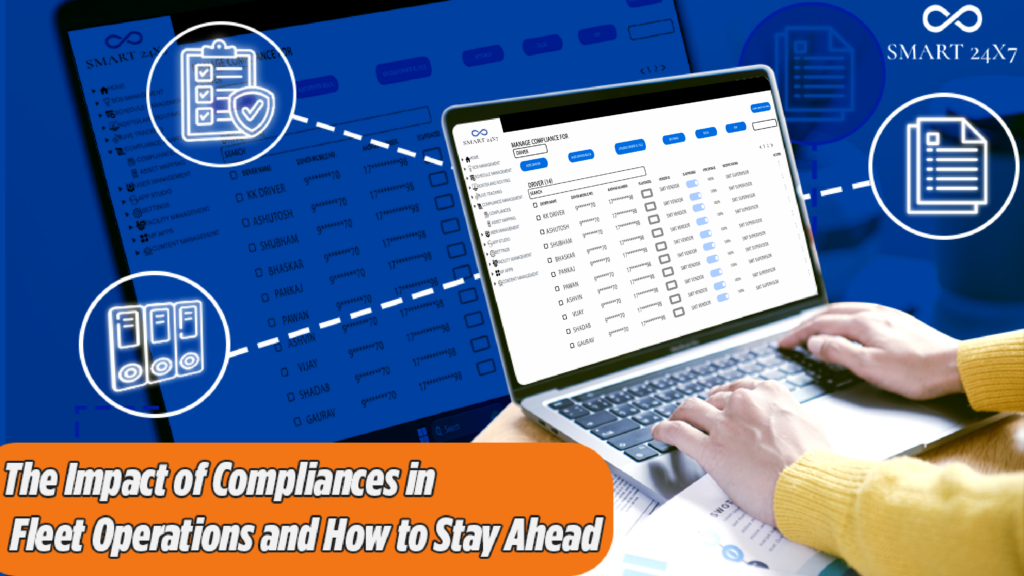In the logistics and transportation industry, fleet compliance is not just a regulatory requirement; it’s a critical element that directly impacts the efficiency, reputation, and operational success of fleet management. At Smart24x7, recognized as the best employee transport management platform, we understand the complexities of compliance in fleet operations and the importance of adhering to them meticulously. Here’s a deep dive into how compliance impacts fleet operations and strategies to stay ahead.
Ensuring Safety Through Compliances in Fleet
Safety is the bedrock of fleet operations:
- Driver Qualifications: Ensuring all drivers meet licensing and certification requirements reduces the risk of accidents and legal issues.
- Fleet Safety Standards: Regular inspections and maintenance mandated by compliance in fleet operations help prevent vehicle failures that could lead to severe accidents.
Adhering to these safety standards not only protects the company from legal repercussions but also builds trust with clients and employees, ensuring a reliable service.
Avoiding Financial Penalties
Non-compliance can be costly:
- Heavy Fines: Regulatory bodies can impose significant fines on businesses that fail to comply with transportation laws.
- Increased Insurance Rates: Compliance issues can lead to higher insurance premiums as insurers assess non-compliant operators as high-risk.
By staying compliant with fleet compliance standards, fleet operations can avoid these unnecessary costs, ensuring financial stability and more competitive pricing.
Enhancing Operational Efficiency
Compliance drives efficiency:
- Streamlined Operations: Following fleet safety standards helps standardize operations and streamline processes.
- Reduced Downtime: Ensuring vehicles and drivers comply with regulations minimizes downtime caused by regulatory interventions.
Effective compliance management can transform potential obstacles into opportunities for enhancing operational efficiency.
Building Corporate Reputation
Compliance affects perception:
- Trust and Credibility: Clients and partners prefer doing business with companies that adhere to legal standards.
- Market Advantage: A strong compliance record can serve as a differentiator in the competitive logistics market.
Maintaining a solid compliance track record enhances market positioning and opens up new business opportunities.
Strategies to Stay Ahead in Compliance
Implementing proactive measures to ensure continuous compliance in fleet operations:
- Technology Integration: Utilize compliance management software to keep track of all regulatory requirements and ensure adherence.
- Regular Training: Conduct ongoing training sessions for all employees to keep them updated on the latest regulations and best practices.
Continuous Monitoring and Auditing
- Internal Audits: Regularly audit operations to ensure they meet all compliance standards.
- Feedback Loops: Establish mechanisms to receive and act on compliance-related feedback from drivers and other stakeholders.
Partnerships with Regulatory Bodies
- Regular Engagement: Maintain open lines of communication with regulatory authorities to stay informed about changes and expectations.
- Compliance Advisory: Consider hiring or consulting with compliance experts to navigate complex legal landscapes effectively.
At Smart24x7, fleet compliance is a cornerstone of our operational strategy. We leverage advanced technology, thorough training, and proactive monitoring to ensure our fleet operations not only meet but exceed regulatory standards. By prioritizing compliance, we safeguard our operations against legal risks, enhance operational efficiency, foster a positive reputation, and ultimately deliver superior value to our clients. Staying ahead in regulatory compliance in logistics is not merely about following rules; it’s about leading the way in responsible and efficient fleet management. way in responsible and efficient fleet management.
